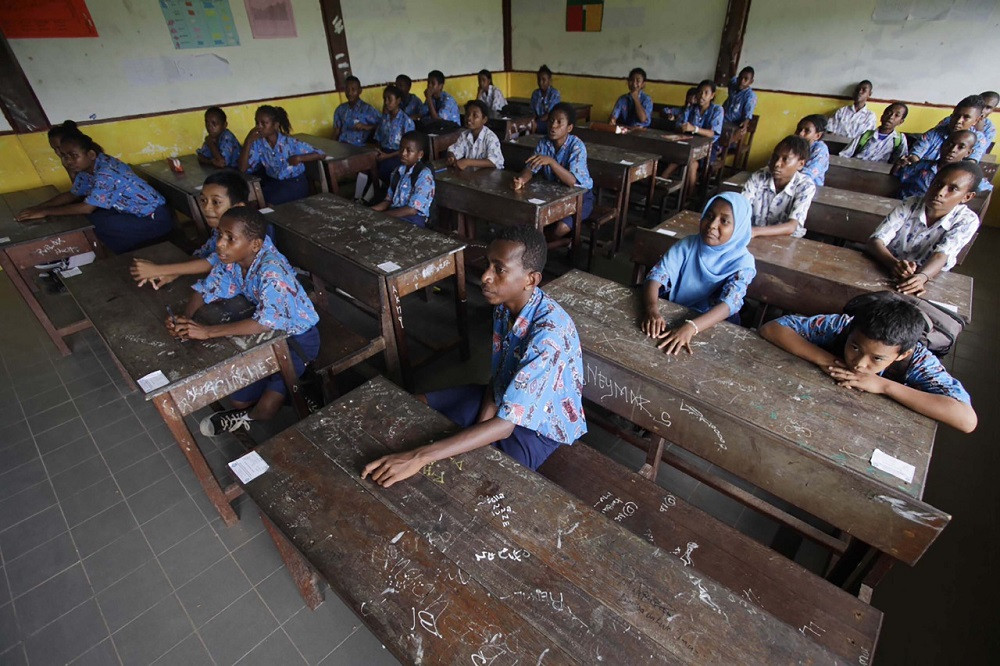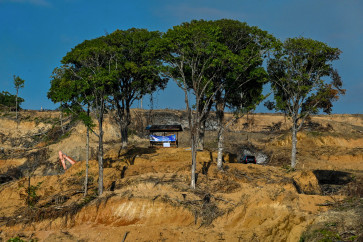Popular Reads
Top Results
Can't find what you're looking for?
View all search resultsPopular Reads
Top Results
Can't find what you're looking for?
View all search resultsEquality of opportunity matters
While slogans and symbolic gestures are inspiring, and the Black Lives Matter movement is important, it is the implementation of practical policy that changes lives.
Change text size
Gift Premium Articles
to Anyone
O
n Aug. 17 this year it will be a mere 75 years since the Proclamation of Indonesian Independence from the Dutch. In contrast, it has been 239 years since the Declaration of American Independence from British colonial rule.
For America’s black population, the lofty constitutional proclamation that, “All Men are Created Equal” is still profoundly contested as the nation-wide Black Lives Matter protests have revealed. Inspired by the killing of George Floyd, a broad global movement has now emerged with the key demand of ensuring “the social, economic, and political power necessary for people of color to thrive”.
My question is, can these milestones be addressed in Indonesia with respect to the people of Papua?
An old expression says that, “an illustration is more convincing than a demonstration”. Three Indonesian Papuans—a career diplomat, a police commander and a director at the Indonesian National Development and Planning Board (Bappenas) share their insights into the structural changes that have provided each of them with an opportunity to thrive.
Fientje Maritje Suebu has served with the Indonesian Foreign Ministry for over 30 years. She is currently deputy chief of mission in New Dehli. Fientje is an ethnic Papuan born in Jayapura, who went to high school in Papua New Guinea, and graduated from Cendrawasih University.
Like all diplomats, she is a citizen of her country but also of the world, having held previous postings in Harare, Brussels and Ottawa. However, her greatest contribution as a diplomat has been her involvement in negotiations to secure the Indonesia-India comprehensive strategic partnership. So, what is the secret to Fientje’s success as a Papuan living in multi-ethnic Indonesia?
Fientje says, “As a senior diplomat, to be eligible for advancement, I must compete with other fellow senior diplomats from all over Indonesia. In my office there are Acehnese, Balinese, Bataks, Padangese, Javanese and other Melanesians from all over East Nusa Tenggara. I believe that I have reached my position on merit—because of my experience, my good work ethic and my ability. I hope that my example will give inspiration to the younger generation of Papuans. I have succeeded, and so can they.”
There are around 14 million Indonesians of Melanesian ethnicity living across the 6,000 inhabited islands of the Indonesian archipelago. Out of a total national population of 273.5 million, there are four million Melanesians living in Papua Province alone, but some 10 million others living from North Maluku to West Timor and from the island of Sumba to the island of Flores.
Many, such as Fientje, have directly benefited from major political reforms, especially Law No. 21/2001. This legislation has not only secured special autonomy for Papua, but also effectively quarantined senior positions in Papua for meritorious ethnic Papuans. However, just as importantly, this initiative secured equal prospects for Melanesians living outside of their home provinces.
Illustrating the experience of Fientje appears to show that Papuans are not disadvantaged—at least in the Indonesian diplomatic corp. Rather, if Fientje is any indication, they are thriving in what is one of the most culturally diverse nations on earth.
So, what about the national police force? Listra Kogoya is a commander in the National Police Mobile Brigade’s Intelligence unit. She is stationed in Depok, West Java. Listra was born and raised in Wamena, Papua. These days her area of special expertise is as a social media analyst. She profiles the perpetrators of online hoaxes and scams.
Her senior rank gives her real influence within the Indonesian police establishment. This year she was chosen as a keynote speaker at the National Police Academy on the topic of domestic cybercrime detection and prevention.
Because Listra serves outside Papua, her local community is predominantly made up of ethnic Javanese and Sundanese. She says, “As a Papuan Indonesian police officer, I maintain a good attitude with everyone and have learnt to speak the local languages fluently. I think for this reason people in my community of Pasir Gunung Selatan accept me as a sister. The same goes for the Indonesian police family. I work with the greatest imaginable human diversity of police officers, so I know very well first-hand how powerful unity in diversity is. And one day, if God wants me to go home, I will be a good role model in Wamena for my Papuan brothers and sisters as well.”
Like Fientje, Velix Wanggai is an ethnic Papuan born in Jayapura. He currently holds the position of director of underdeveloped regions and rural development at the National Development Planning Agency (Bappenas). His new responsibility is to formulate and implement national policy for both Papua and West Papua. His specific brief at Bappenas and the Ministry involves preparing a new national policy framework to empower Papuans in all aspects of social and political life.
In this role, Velix stresses that Papuan (and West Papuan) special autonomy is being reimagined at Bappenas to eliminate what he refers to as the “vertical conflict” that exists between Jakarta and Jayapura. One significant reform is culturally based. The new Papuan Consultative Assembly (MRP) will create a powerful political opportunity for Papuan tribal groups, women’s groups, and religious organizations at a national level.
Another is to significantly increase Papua’s share of national revenue with an emphasis on infrastructure development, especially in health and education. And finally, consistent with one of the most important demands of the Black Lives Matter movement, all Papuan leaders in Papua and West Papua from the level of governor to the regents and mayors, will be ethnic Papuans directly chosen by the Papuan people—essentially democratic decentralization.
Velix describes his work at Bappenas this way, “Greater special authority for Papuans in Papua in fiscal policy and in the creation of human capital frameworks, involving both affirmative policy and strategic development policy. This especially incorporates transparent human rights affairs with policy actions and choices determined by Papuans like me, for Papuans, in a pluralistic, multi-ethnic and multi-cultural Indonesia.”
Clearly, human diversity emphatically charts the success of both Indonesian society and individual Indonesians—such as Ibu Fientje, Ibu Listra and Bapak Velix. And while slogans and symbolic gestures are inspiring, and the Black Lives Matter movement is important, it is the implementation of practical policy that changes lives.
The examples of a black Indonesian diplomat, a black high-ranking Indonesian policewoman and a black senior Indonesian bureaucrat tell a story that equality of opportunity really does matter and that real milestones are achievable.
***
The writer is a senior consultant with the Australian-based consulting firm Cultural Consulting and the first non-Muslim to teach in the International Program of the Islamic University of Indonesia, Yogyakarta.










